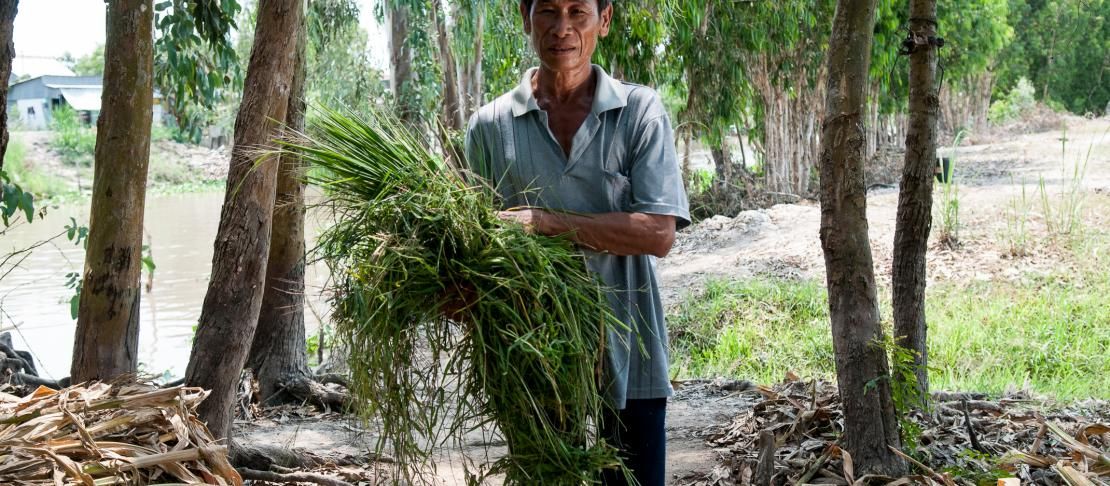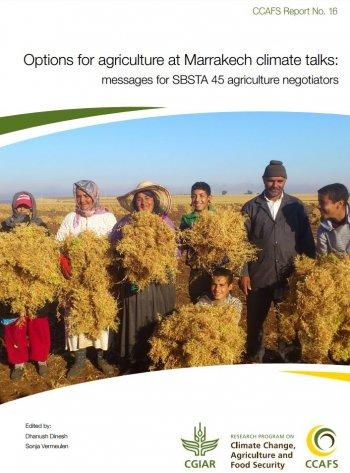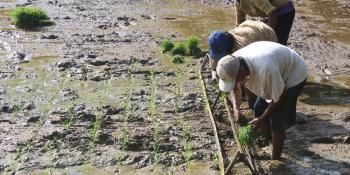Southeast Asian countries call for climate action in agriculture ahead of Marrakech climate talks

The Marrakech climate talks in November marks a major milestone for climate negotiations on agriculture.
After five years of discussions, initiated at the 17th Conference of Parties (COP) of the United Nations Framework Convention on Climate Change (UNFCCC) in Durban, countries will determine next steps in Marrakech.
Southeast Asian countries are calling for greater climate action in the agricultural sector
Ahead of these talks, and in recognition of the need for a stronger position as a region, the Southeast Asian countries are calling for greater climate action in the agriculture sector through common approaches put forward by a newly-proposed Association of South East Asian Nations (ASEAN) agriculture negotiation group. In a preparatory meeting hosted by Vietnam on August 15, 2016, the ASEAN highlighted the need for a positive conclusion to the discussions on agriculture. The results of this preparatory meeting were immediately relayed to the Special Senior Officials Meeting of the 37th meeting of the ASEAN ministers on Agriculture and Forestry, in the Philippines, which advised for close collaboration between each member state’s climate negotiation team, and the agriculture sector so that the next steps to support countries in their efforts to cope with climate change impacts will be put in place. Dr Chu Van Chuong, Deputy Director General of International Cooperation at the Ministry of Agriculture and Rural Development, Vietnam noted:
SBSTA 45 is a crucial milestone for UNFCCC negotiations on agriculture, as we are at the culmination of a five year long process. The agriculture sector is a priority for Southeast Asian countries, and we see elements of technology transfer, capacity building, finance, and knowledge sharing to be important components of a SBSTA decision”.
See the photos from the meeting:
Photo credit: S. Sarie (GIZ)
Why climate action in agriculture in Southeast Asia?
Southeast Asian economies are highly reliant on agriculture, fisheries, forestry and other natural resources related activities. The region is highly vulnerable to climate change, which threatens these economic activities and the livelihoods of millions. Impacts of climate change in the form of temperature increase, erratic rainfall patterns, and extreme climatic events (such as strong typhoons and severe droughts) are already being felt across the region. Earlier this year, the region experienced a drought, considered the worst in decades, affecting agricultural production and livelihoods. In this context, urgent actions are required to increase the resilience of the region to cope with future climate impacts.
What are the priorities for Southeast Asia?
To support the transition of the region’s agriculture sector, the 10 ASEAN member states (Brunei Darussalam, Cambodia, Indonesia, Lao PDR, Malaysia, Myanmar, Philippines, Singapore, Thailand and Vietnam) highlighted their priorities in joint submissions and statements at the Bonn climate talks earlier this year. The key priorities identified include:
Focus on off and on farm actions: Southeast Asian countries recognize the need for “on farm” actions, such as better management of livestock, fisheries, crops, trees or soil, water, as well as “off farm” actions such as those relating to infrastructure, extension systems, meteorological services and crop and livestock insurance.
Foster greater regional cooperation: Countries in the region have common problems, which may often have common solutions. Therefore, fostering greater regional cooperation is a priority. The region has established the ASEAN Climate Resilience Network to promote climate resilience through exchange of information, expertise, and experiences amongst ASEAN member states.
Improve decision support for climate actions in agriculture: Considering the context-specific nature of climate impacts, decision-makers need frameworks and tools to assist them in channeling adaptation investment in efficient, effective and equitable ways to address existing and future challenges.
Scaling up from pilots: There is a need to invest in pilot projects which generate evidence on successful interventions. At the same time, there is an urgent need to scale up successful pilots so that successful models can reach millions of farmers in the region.
Address gender and social inequality: Mechanisms to guarantee women’s involvement in developing and implementing adaptation strategies and financing, and efforts to protect and encourage women’s access to national adaptation programs and projects are a priority.
Mobilize greater funding for adaptation in the agriculture sector: To drive forward transformational change needed in the sector, greater amounts of funding is needed, and such funding should be accessible to countries.
Build capacity and support technology transfer: Building capacity to identify, implement and scale up climate actions in the agriculture sector is a priority. Such efforts should be undertaken hand in hand with efforts to build market linkages. Access to technologies and services which increase resilience is also a priority.
What can the UNFCCC and the international community do?
Options for agriculture at Marrakech climate talks: messages for SBSTA 45 agriculture negotiators
There are a number of possible actions which the UNFCCC and the international community can undertake to address the needs of Southeast Asian countries. These include:
- Prioritise the agriculture sector in activities of the UNFCCC finance, capacity and technology mechanisms.
- Promote knowledge sharing related to climate actions in the agriculture sector through a dedicated knowledge and learning platform, or through a dedicated work programme under SBSTA.
- Address agriculture in the agenda item on gender and climate change, considering the prominence of women farmers in agriculture and food systems.
- Leverage on processes outside the UNFCCC such as through relevant UN agencies, Non-Governmental Organizations, and International Organizations, to support climate actions in the agriculture sector.
Global frameworks to regional actions
The landmark Paris agreement, which highlighted the importance of food security, has created a global framework for climate actions. A positive decision on agriculture at the forthcoming climate talks could further support this framework and help drive action in the sector. However, global decisions and frameworks will need to be supported with regional, national, and sub-national mechanisms for implementation. Mr Beau Damen, Natural Resources Officer - Climate Change and Bioenergy at FAO’s regional office for Asia and the Pacific noted:
In their INDCs, ASEAN member states have identified over 90 actions in the agriculture and land use sector. Implementation of these actions would require national level coordination mechanisms, support through UNFCCC frameworks, and through processes and organizations outside the UNFCCC.”
CCAFS has been working with Southeast Asian countries to support climate actions at various levels. At the field level, CCAFS is piloting Climate-Smart Villages in Cambodia, Lao PDR and Vietnam. At the national level, the focus has been on working with policymakers and National Agriculture Research Systems in Cambodia, Lao PDR, Myanmar, Philippines, and Vietnam. At the regional level, CCAFS has partnered with the ASEAN CRN to strengthen technical and institutional capacities in ASEAN member states. The ASEAN-CRN is largely supported by the Federal Ministry for Economic Cooperation and Development (BMZ) through the ASEAN-German Programme on Response to Climate Change in Agriculture and Forestry (GAP-CC) which is implemented by the Deutsche Gesellschaft für Internationale Zusammenarbeit (GIZ) GmbH in close cooperation with the ASEAN Secretariat (ASEC).
Related readings
- Report: Options for agriculture at Marrakech climate talks: messages for SBSTA 45 agriculture negotiators
- Working paper: Agricultural practices and technologies to enhance food security, resilience and productivity in a sustainable manner: Messages to the SBSTA 44 agriculture workshops
- Info note: Climate change adaptation in agriculture: practices and technologies. Messages to the SBSTA 44 agriculture workshops
- Working paper: Adaptation measures in agricultural systems: Messages to the SBSTA 44 Agriculture Workshops
- Info note: Measures for climate change adaptation in agriculture. Messages to the SBSTA 44 agriculture workshops
Imelda Bacudo is Senior Advisor and Deputy Head of Project, Forest and Climate Change (FOR-CC) under the ASEAN-German Programme on Response to Climate Change, Deutsche Gesellschaft fuer Internationale Zusammenarbeit (GIZ) GmbH.
Dhanush Dinesh is Global Policy Engagement Manager at the CCAFS Coordinating Unit.



